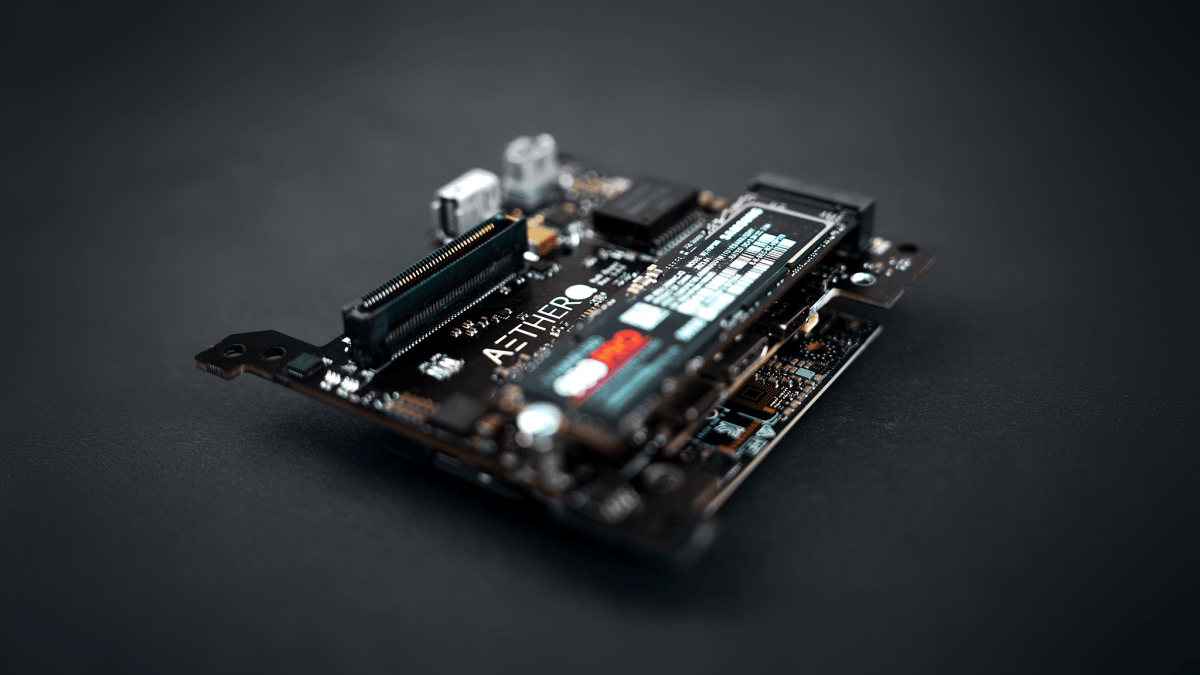Satellite sensors collect an incredible amount of raw data, but on-orbit compute limitations mean that operators have little way to process this data in space.
Aethero, a startup founded 13 months ago, wants to change that. The startup is developing radiation-hardened edge computers for on-orbit data processing and eventually even autonomous decision-making.
“Right now pre-processing of space data is the larger market, but we anticipate that as the years go on, and as there’s more orbital assets, enabling autonomy for spacecraft is going to be massive,” co-founder and CEO Edward Ge said in a recent interview.
Ge founded Aethero with Amit Pinnamaneni; the pair grew up together in the same small Michigan town, and went on to found Stratodyne, a startup that was building high-altitude balloons for remote sensing, in 2020. The company was accepted to Y Combinator’s winter 2022 cohort, but had to drop out due to legal issues related to a set of government import and export regulations known as International Traffic in Arms Regulations.
The two returned to the University of Michigan; Pinnamaneni started in a graduate program doing research on embedded systems in hostile environments, like high-radiation spaceflight environments. That’s where he and Ge started developing the hardware that has ended up becoming Aethero.
Although high-altitude balloons may not seem immediately related to on-orbit compute hardware, Ge said both ventures confront a similar problem. Space computers today are using older field-programmable gate arrays (FPGAs) with older architectures, which can’t handle computationally-intensive tasks, like training models on orbit or deploying advanced computer vision models on orbit.
“We realized that the problem isn’t getting enough data from space […] the problem is one, getting data from the sensor in space to the end user fast enough, and two, enabling the satellites in orbit to make real time decisions on their own.”
“Ultimately spacecraft need to have a decision-making capability in real time at their position, versus relying on mission control forever,” he added.
Aethero, powered by a $1.7 million pre-seed round that closed last fall, has ambitious plans to enable such capabilities. The startup’s first generation space computer is called the AetherNxN, which is based around an Nvidia Orin processor. Orin is the best GPU edge processor out on the market right now, Ge said, and using proven hardware will let the startup hit the ground running. It’s designed for 7-10 years of life in low Earth orbit and can fit on platforms as small as a CubeSat. It provides 20x more processing power than existing options, Ge said.
Aethero is planning to release a larger, second-generation module for bigger spacecraft before transitioning to a proprietary space processor. Switching to a proprietary, domain-specific processor has some advantages, including lower power usage and faster performance, the company says. The San Francisco-based startup is aiming to manufacture that with computing giant Intel around 2026, though Ge said that depends on a number of variables.
The five-person team is sending its MVP to space three times this year; one of the missions will launch this June on SpaceX’s Transporter-11, to demonstrate that the product works in space and demonstrate capabilities like the ability to deliver over-the-air updates to onboard computer vision models, and the ability to train computer vision models in space using data collected by that same spacecraft.
While Ge couldn’t discuss conversations with customers, he did say Aethero has seen certain demand themes from the Earth observation market and from on-orbit servicers and private space stations. The ISS generates terabytes of data each day, he said, so edge computing could enable much greater data processing.
“We see ourselves as becoming the Intel or Nvidia of the space industry,” he said.



![[CITYPNG.COM]White Google Play PlayStore Logo – 1500×1500](https://startupnews.fyi/wp-content/uploads/2025/08/CITYPNG.COMWhite-Google-Play-PlayStore-Logo-1500x1500-1-630x630.png)